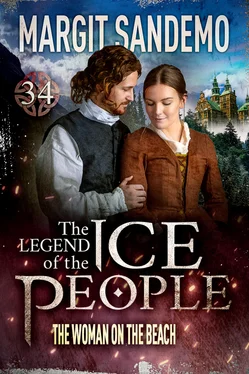Now his wife got up and spoke directly to her husband. She didn’t make an effort to speak so that the others could understand her, but used her own dialect, which happens to be one of the most obscure. She said that it had started to rain and that she was going out to the stable. But none of their guests grasped that.
The man nodded and his wife left.
There was a small break in the conversation when she left the room. Diderik Swerd stretched himself in the chair. His feet had enjoyed the warmth from the fire so much that they were now dry and he could walk on them again. They were ugly, square feet with long, gnarled toes that were filthy, but they had served him well. On endless marches in battle or through hours of monotonous guard duties.
Diderik was about to drop off to sleep when the priest’s grumpy sharp voice pierced his ears. “What is it that’s so dangerous in there?”
The peasant looked him straight in the eye. “Have you never heard of Vargaby’s virgins?”
“No, what’s that?” blurted Diderik Swerd. “I must say that word ‘virgins’ appeals to me. Are they young and tender?”
“Stay away from those virgins if you value your life. They’re not for mortal men.”
“Nothing but nonsense, eh?”
“Maybe. Maybe not. Vargaby exists – and I’m sure they have some virgins there now. But nobody who doesn’t belong there should enter that village voluntarily.”
The priest breathed disapprovingly through his nose. “Enough of this! Let’s be absolutely clear. Is there a village in the forest?”
The peasant replied hesitantly: “There are bound to be herders’ settlements here and there. Perhaps villages as well. But none like that one.”
“Have you been there yourself?” asked King Gustav’s emissary.
“I’ve seen it, and it’s beautiful. Surrounded by the forest ...”
“Is it big?”
“Heavens, no! Eight or ten farms in a cluster. That’s all.”
“That is bound to lead to terrible inbreeding. Do you know the people there?”
“No. As you can tell by our language, our villages are secluded from each other.”
“Is there something wrong with it then?”
The peasant tried to make himself more comfortable in his seat. Now and then, the flames from the fireplace cast light on beautiful decorated chests, wooden boxes, milk pails on the shelves along the walls and built-in beds in the corners. This was the home of a prosperous farmer.
He said slowly: “It’s only a legend, but we respect it.”
“Let’s hear it,” said Diderik Swerd, and the derogatory mirth in his voice didn’t escape the peasant’s attention.
The silent follower sat outside the circle in the semi-darkness. His silence indicated his subordinate position and, even more, Diderik Swerd’s obnoxious treatment of him.
“They say it happened at the time when Dalarna was converted to Christianity,” said the peasant. “You must know that the peasants of Dalarna weren’t willing to become Christians. The villages in the wilderness believed in the ancient Norse religion.”
“Yes, I can well believe that,” said the priest with a grimace.
André thought about this: here is a legend within the legend! We’re moving even further back in time. Well, well, I suppose I must try to keep pace. Now he was beginning to become curious about Vargaby.
“So the Lord’s messenger came to Vargaby,” said the peasant, “with a cross and the singing of hymns – while the worst paganism, worse than anybody could suspect, reigned there.”
His wife had come in again and had heard the last words. “Ugh,” she said, turning her head away. “Do you have to talk about that?”
The priest replied sharply: “We want to know the facts. This must have happened in the eleventh or twelfth centuries, because I know that the areas on the fringes of Dalarna and Härjedalen refused to convert to Christianity. Obdurate sinners!”
“I don’t want to pass judgement on that,” said the peasant quietly. “Anyway, it turned out that a sort of feudal regime was in place there. One farmer owned virtually the entire village and the other inhabitants were his slaves. It’s said his name was Vret Joar Jonsson. He was a powerful man. With hair and a beard that was like a cloud around his stony face. Vret Joar Jonsson had a vice – or a virtue, if you like. He loved virgins.”
“Who doesn’t!” muttered Diderik with a wry grin.
“Anyway, Vret Joar loved them in his own way. He sacrificed them to the pagan gods. To Freyr, the fertility god.”
“What? Sacrificed them?”
“Yes. It’s true! Every year, he would bare himself on the altar there, and every year a virgin would die.”
“But this is awful!” bellowed the priest.
“Absolutely! He wasn’t able to have sex with women, and that was why he offered them up – so that his masculine power might return to him.”
A woman wrote this in the nineteenth century! André thought. Petra’s mother Gerd must have been quite a character. He continued reading but had to switch on the light because darkness had fallen so suddenly. At first, he thought that it was the handwriting that was beginning to be unclear, but then he discovered that it was just the light that had faded.
“Honestly,” protested the priest. “All that belonged in the Bronze Age, perhaps. But not in our era.”
“You’ve heard our language, which you can only just make out. And we live by the river and aren’t completely cut off from the surrounding world. Don’t you understand how secluded the villages in these forests were hundreds of years ago? Human customs and piety had difficulty reaching into the forests and mountains of Älvdalen. The villages didn’t communicate with one another. They probably hardly knew that there was a world beyond the edge of the forest. They were hardly aware of the neighbouring village. Even today, Vargaby and other small hamlets in the wilderness are cut off from all human contact. Evil rituals can blossom in such lonely soil.”
Diderik looked thoughtful. “I can well understand that. But it was only a small village, after all! How could Vret Joar get hold of so many virgins?”
“Oh, there weren’t that many of them. His sacrifices went on for only four or five years before it all ended terribly.”
“Oh, and how did that happen?”
“I don’t need to tell you that people hated Vret Joar. They hated him, but feared him even more. He had a son, whom he had fathered when he was still able to embrace a woman. He taught his son to continue his work. Every virgin in the village was to be sacrificed ...
“But the evil man was punished! Vret Joar Jonsson complained bitterly about his lot. He couldn’t find rest even for a single night. The dead virgins persecuted their slayer in his dreams. They would appear night after night.”
The priest nodded. “That was his guilty conscience.”
“It was worse than that. It’s said that they really came. That their ghosts really harassed Vret Joar. But they were only spirits and were unable to reach him completely. They longed to be able to kill him, as they themselves had been killed – but they weren’t able to. That was why they tormented him in his dreams. He even said that when he was awake, he could swear that he had seen them.”
“This seems to be a worse punishment than being killed,” said Diderik. “Tell me ... How were the women sacrificed? Were they burnt?”
“No, not at all. The Norse god, Freyr, was said to live by a small lake in the forest. There the women were forced into the water. By a wall of spears.”
The priest gave a moan.
Diderik wanted to know: “Wouldn’t it have been more straightforward to stick the spears into Vret Joar?”
“They couldn’t do that because he had guards. Loyal men, who wanted to ingratiate themselves.”
Читать дальше












